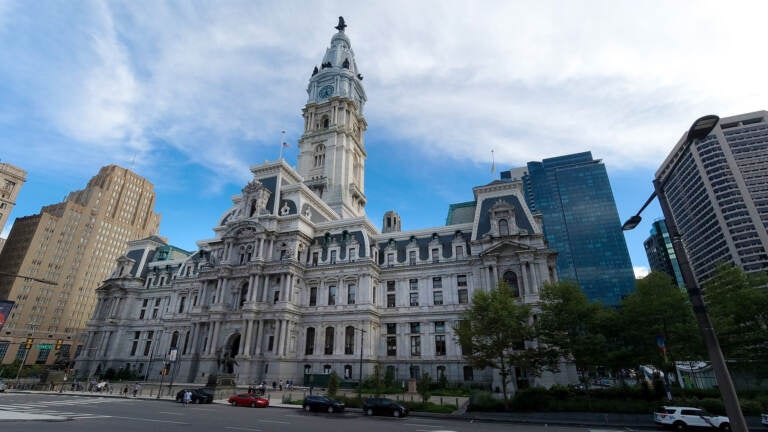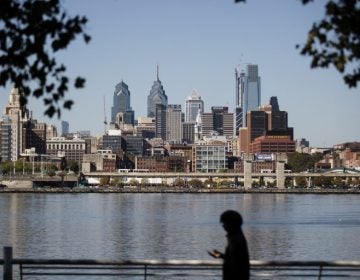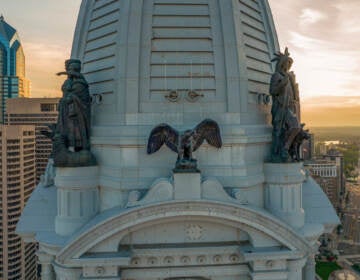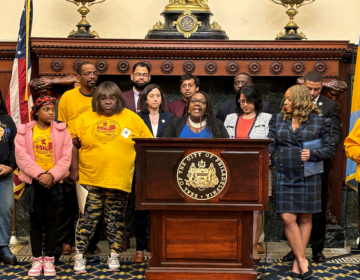Philly City Council sends budget, property tax relief to Mayor Kenney’s desk
The budget includes no tax hikes, steps to ease the tax burden of rising property valuations, and a spending increase for violence prevention measures.

The exterior of City Hall in Philadelphia. (Mark Henninger/Imagic Digital)
Got a question about Philly’s neighborhoods or the systems that shape them? PlanPhilly reporters want to hear from you! Ask us a question or send us a story idea you think we should cover.
During its last legislative session before summer recess, Philadelphia City Council finalized a budget agreement that offers homeowners additional property tax relief, while minutely lowering the city’s wage and business taxes. The compromise, rooted in a $5.8 billion operating budget, does not include any tax hikes.
“This budget is an investment in people.” said Maria Quiñones-Sánchez, who chairs the body’s Appropriations Committee.
Council and Mayor Jim Kenney’s administration both sought to ease the financial burden of rising property assessments. After a three-year pause, residential property values went up by an average of 31% this year. An independent analysis conducted by the City Controller’s Office found that values shot up more than 50% for nearly a quarter of all single-family parcels, of which there are approximately 450,000.
In the end, homeowners will see a dramatic increase in the value of the city’s Homestead Exemption. Under a proposal passed on Thursday, residents can apply to have $80,000 deducted from their property’s value, which could lower their property tax bill by about $1,119 each year. For years, the exemption has sat at $45,000, which has saved homeowners about $629 annually.
“We want to make sure that a senior doesn’t have to make a decision between buying prescription drugs or paying for their property taxes. We want to make sure that a young family doesn’t have to make a decision between paying for daycare services for their children or paying their property taxes. We want to make sure that even renters do not get evicted,” said Councilmember Kenyatta Johnson, who had pushed to double the exemption to $90,000, the maximum permitted by state law.
Kenney had proposed increasing the exemption to $65,000. His administration argued that a higher rate would drain considerably more money from the city’s general fund, which is used to pay for basic services such as the police and fire departments.
The general fund also supports the School District of Philadelphia’s budget, stirring district officials to push back on more aggressive tax relief proposals like Johnson’s, which they say would cost schools millions in critical revenue.
“A vote for this new package will force reductions in the support we provide for Philadelphia’s children. A vote for this proposal is a vote to defund education in Philadelphia,” wrote former Superintendent William Hite of Johnson’s plan, in an op-ed published last week.
Johnson’s “Save Our Homes” plan, which passed Thursday along with the rest of the council’s budget proposals, also increases funding for the Longtime Owner Occupants Program by $10 million to $35.2 million. A homeowner’s property value is capped at 150% of the previous year’s value, or, if it has risen by more than 175%, capped at 175% of the lowest certified market value during the previous five tax years.
The program is geared toward helping homeowners with low income in gentrifying sections of the city.
Amid an ongoing surge in non-fatal shootings and homicides, the city’s new operating budget includes $184 million for violence prevention measures. Anti-violence initiatives received a total of $155 million — an unprecedented investment — during the fiscal year that ends June 30.
Council added another $28 million to the budget for placemaking efforts — programs designed to promote the overall health of a community that can have a direct correlation with the level of crime in an area. The new budget includes $2 million to tow abandoned cars; $2 million to combat short dumping; and $1 million for lighting improvements, among other quality-of-life expenditures.
Another $15 million will go towards rental assistance, as the city continues to wrestle with an affordable housing crisis exacerbated by the pandemic. The Defender Association of Philadelphia, which provides free legal representation to 70% of people arrested in the city, is getting an additional $5.8 million. The City Commissioners will receive an additional $6 million to administer elections.
Under Kenney’s budget proposal, the mayor wanted to reduce the city’s wage taxes. The finalized deal will cut it slightly from 3.83% to 3.79% for residents. The non-resident rate will change from 3.448% to 3.44%.
The budget agreement also slightly reduces the net income portion of the city’s Business Income and Receipts tax. It will go from 6.2% to 5.99%, the first time since the late 1980s that it has dipped below 6%.
This is Kenney’s second-to-last budget cycle before the end of his second and final term in office.
“I am proud of the collaboration that has gotten us to this point, as this budget focuses on providing — and in some cases expanding — core services while maintaining our long-term fiscal health, reducing racial disparities among Philadelphians, and advancing equitable outcomes for all Philadelphians. I’m grateful for our partnership with City Council and thank councilmembers for its final passage,” said Kenney.

Subscribe to PlanPhilly
WHYY is your source for fact-based, in-depth journalism and information. As a nonprofit organization, we rely on financial support from readers like you. Please give today.









